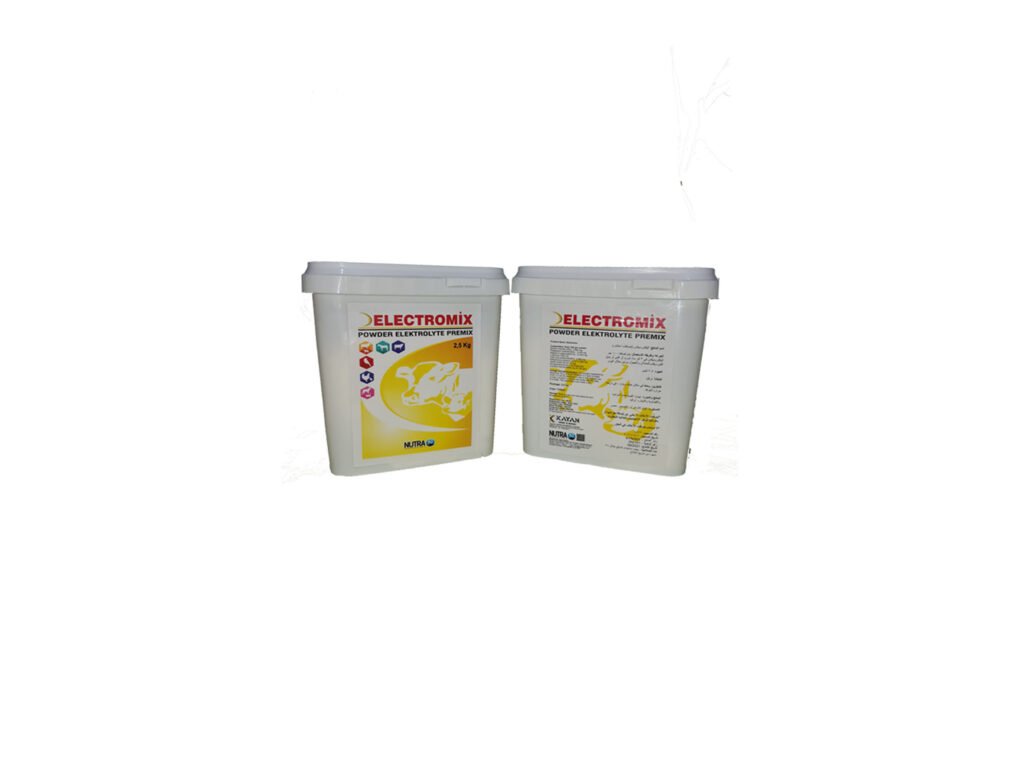
ELECTROMİX
COMPOSITION
(per 100g)
Sodium chloride………….. 4.680mg
Poatassium cholride …….. 2.240mg
Sodium bi carbonate…. 13.440 mg
L-Glycine ……………………. 4.500mg
Citric acid anhydrase ……..8.860mg
Enterecoccus faceium 1×10¹² 2.500mg
Vanilin butter flovaur …………25mg
Lactose monohydrate up to 100gm
P) Potassium:
• Mainly cardiac and neuromuscular. Potassium deficiency causes especially ventricular arrhythmias and heart failure.
• The most prominent is neuromuscular. Symptoms are paresis, paralysis, and respiratory failure.
(Cl) Chlorine :
• Contributes to the regulation of plasma osmotic pressure.
• It plays a role in the regulation of acid-base balance.
• Contributes to the regulation of water metabolism.
(Na) Sodium :
• It is effective in regulating osmotic pressure; plays a role in the distribution of water.
• It plays a role together with Cl- and HCO3- in the regulation of acid-base balance.
• It regulates cell membrane permeability.
• It takes place in the structure of important compounds and cells.
• Plays a role in muscle-nerve stimulation; takes place in the numerator part of the muscle-nerve stimulation equation.
Glycine:
• It is an inhibitory neurotransmitter in the central nervous system, especially in the spinal cord, brain stem and retina.
• When glycine receptors on neurons are stimulated by glycine, Cl- flows into the neuron via ionotropic receptors.
• Provides nutritive activity as glycine can be easily converted into other proteins.
Citric Acid:
• It bonds very easily with minerals and electrolytes, and thanks to this feature, it facilitates the intake of minerals and electrolytes into the body.
• By balancing intestinal Ph, it stops bacterial growth and facilitates food intake.
Lactose:
• It is a milk energy product. It is metabolized in the liver and used as sugar to meet the energy needs.
Enterecocus faceum :
• It is a probiotic. After ingestion, it multiplies by settling in the villi in the intestinal tract. It prevents other pathogenic microorganisms from settling in the intestinal tract.
• Thanks to the enzymes they synthesize, they facilitate the absorption of nutrients.
Intended Use :
It is used to provide electrolyte balance in calf diarrhea, to meet energy and protein needs, to reduce the effect of pathogens by covering the villi with probiotics in the intestinal tract.
Usage:
The solution prepared by adding 1 sachet (100gr) into 2 liters of 45 °C water is drunk at one meal. Two applications are made per day.Packaging Type:
100 gr. in a plastic box or aluminum metallized bag, 2500 gr. in plastic bucket packages

